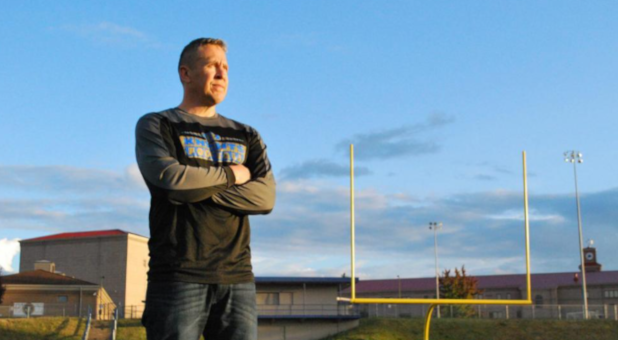Religious Freedom Touchdown?: Supreme Court Leans in Favor of Football Coach Fired for Silently Praying on Field
Monday, the U.S. Supreme Court heard the case in which a high school football coach was fired for silently praying on the field after games. Most of the Justices seemed favorable to Coach Kennedy’s arguments.
Liberty Counsel filed an amicus brief in Kennedy v. Bremerton School District, in support of coach Joe Kennedy, an 18-year Marine veteran. On January 18, 2022, Liberty Counsel presented oral argument in a separate case, Shurtleff v. City of Boston. In that case, like in the Coach Kennedy case, the government argued that what otherwise appears to be private speech is government speech. Following the argument in Shurtleff, it appeared clear that the Justices were not sympathetic to the argument that the government could claim private speech is actually government speech and thereby censor it. Although not as clear in today’s argument involving Coach Kennedy, it appears the Justices were skeptical of the school district’s claim that Coach Kennedy’s speech was government speech.
Today, the High Court focused on two questions: (1) Whether a public school employee who says a brief, quiet prayer by himself while at school and visible to students is engaged in government speech that lacks any First Amendment protection; and (2) whether, assuming that such religious expression is private and protected by the free speech and free exercise clauses, the establishment clause nevertheless compels public schools to prohibit it.
In his argument, Kennedy frames the question before the justices as whether his “brief, quiet prayer” at the 50-yard line is protected by the First Amendment and, if it is, whether public schools can nonetheless prohibit it to avoid violating the establishment clause. The Constitution protects prayer and both public school teachers and their students “do not ‘shed their constitutional rights to freedom of speech or expression at the schoolhouse gate.'”
On the other hand, Bremerton School District counters with the argument that when Kennedy prayed at the 50-yard-line after games, everyone saw him as a coach and serving as a “mentor and role model.” Since Kennedy was acting as a government employee at that moment, the district argues that his speech was government speech not protected by the First Amendment.
Today, although not crystal clear, a majority of Justices appeared to lean in favor of Coach Kennedy. The attorney for Bremerton High School had a difficult time responding to Justice Gorsuch’s question about whether a coach doing the sign of the cross was government speech which the district could restrict. Justice Thomas and others pressed the question of whether the district would censor a person kneeling for non-religious reasons.
In 2008, Bremerton High School football coach Kennedy made a promise to God that he would pray and give thanks after each game he coached, regardless of the outcome. Coach Kennedy would simply drop to one knee and pray for 15-30 seconds on the 50-yard line at the end of games to “offer a silent or quiet prayer of thanksgiving for player safety, sportsmanship, and spirited competition.” Initially, Kennedy prayed quietly and alone. After several games, some students took notice and joined him. If students gathered, Kennedy began offering short motivational speeches to players, ending with a brief prayer. Sometimes no players gathered, and he prayed alone. He did this for seven years without any complaints by school officials. Then in 2015, the school district ordered Kennedy to stop, stating his practice violated the Establishment Clause of the U.S. Constitution. When he refused, the district terminated him.
A federal district court in Washington and then the Ninth Circuit Court of Appeals sided with the school district. In 2019, the U.S. Supreme Court declined to review the case but four justices — Alito, Thomas, Gorsuch, and Kavanaugh — signaled that the Court would be open to hearing the case at a future time. They wrote, “The Ninth Circuit’s understanding of the free speech rights of public school teachers is troubling and may justify review in the future.”
Kennedy returned to the Supreme Court in September 2021, telling the justices that the Ninth Circuit’s ruling used “imagined Establishment Clause concerns to inflict real Free Exercise Clause damage.” The High Court finally took the case on January 14, 2022.
Bremerton School District’s defense states it wants to avoid the perception that it approves of Coach Kennedy’s religious speech. However, Liberty Counsel’s amicus brief illustrates it is illogical to believe the school district was endorsing religion by permitting Coach Kennedy to silently pray on the field after the game. He did not lead a group in prayer during the game; he did not say a prayer over the intercom; and he did not compel team members to join him in prayer. Rather, as a private individual who happened to be the coach, he went to the fifty-yard line to quietly say a prayer. Since school officials would have permitted him to engage in other speech on the field, censoring his religious expressive speech is viewpoint discrimination and demonstrates hostility toward religion.
Faith & Liberty ministry had a live broadcast in front of the Supreme Court to kneel and pray for religious freedom and freedom of speech as the High Court heard the case.
Liberty Counsel’s Founder and Chairman Mat Staver said, “This case is an opportunity for the High Court to affirm that every American has the right to engage in individual religious expression without fear of punishment. Banning a coach from silently praying after a game is illogical and unconstitutional.” {eoa}
For the original article, visit our content partners at lc.org.
Read articles like this one and other Spirit-led content in our new platform, CHARISMA PLUS.














































